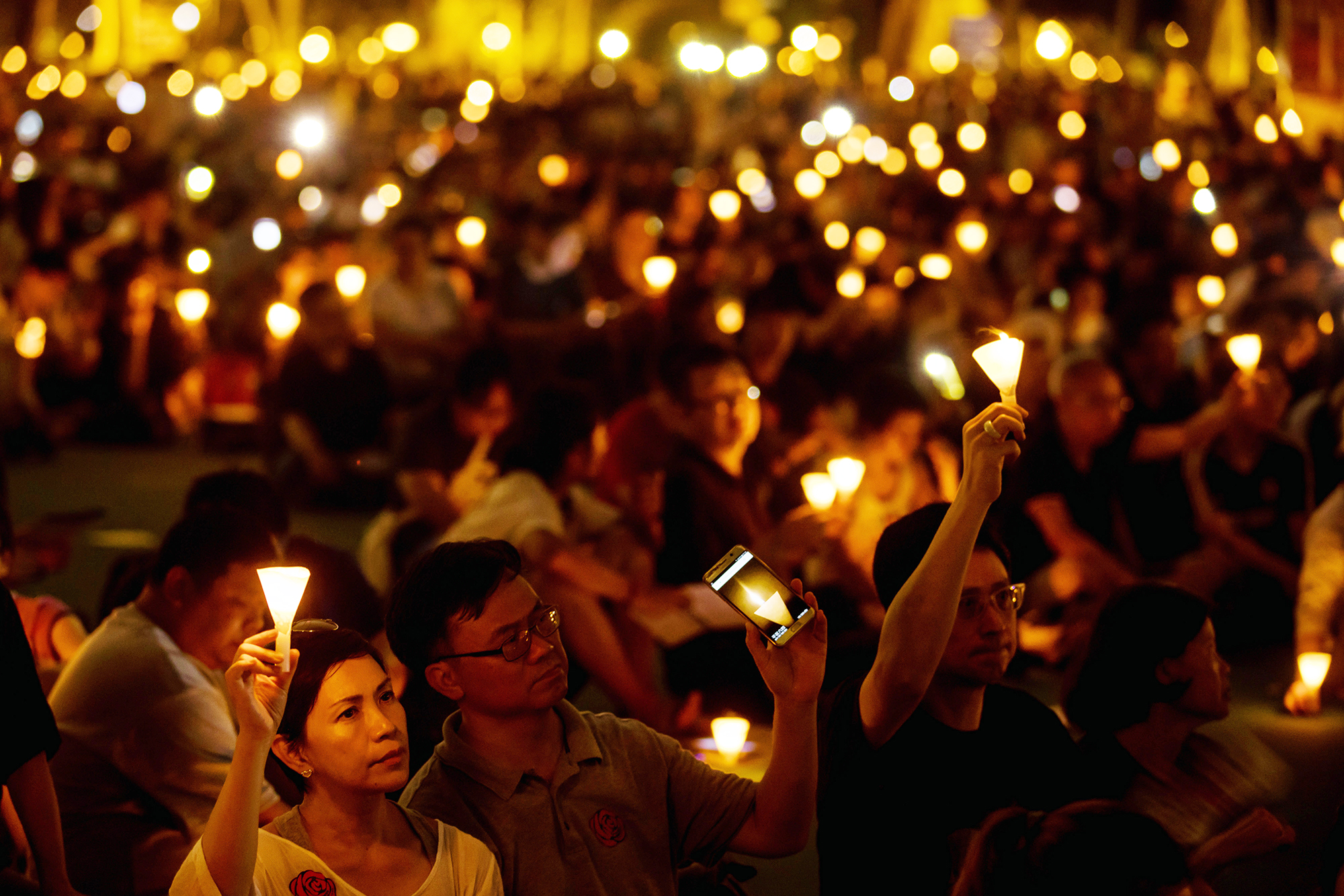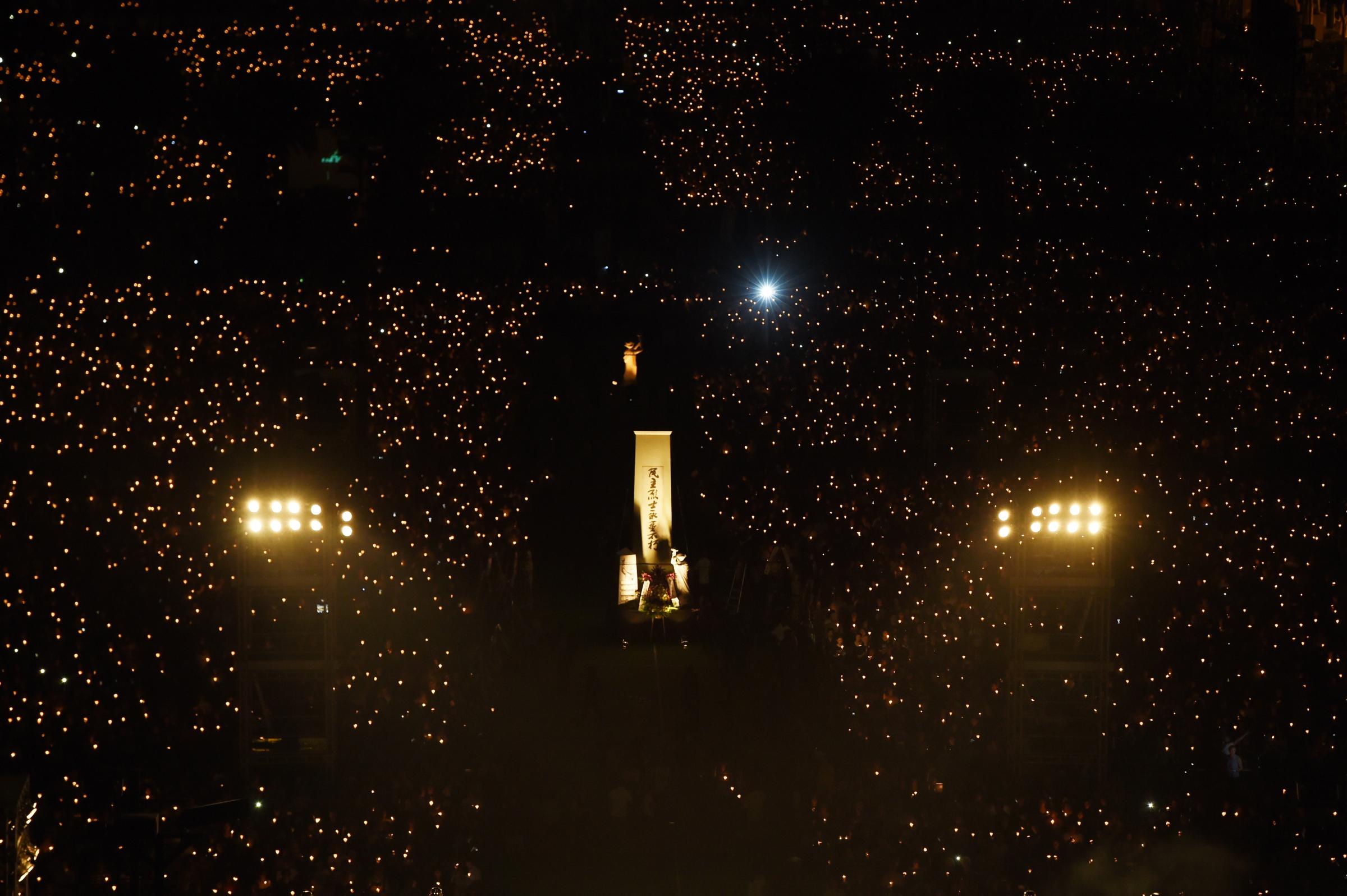
For the 28th year in succession, a sea of light illuminated Hong Kong’s Victoria Park on the evening of June 4 in commemoration of the anniversary of the 1989 Tiananmen Square massacre in Beijing.
Tens of thousands of people gathered Sunday night local time to remember the day when China’s Communist government deployed tanks and troops in the heart of Beijing to put weeks of pro-democracy student protests to a bloody end. The number of fatalities remains unknown but is generally thought to be in the hundreds if not thousands.
By 8:25pm, six adjacent soccer fields had been filled with demonstrators braving the hot and muggy weather, forcing latecomers to spill over onto nearby lawns.
Organizers estimated that 110,000 people had gathered, while police estimated that just 18,000 took part, according to public broadcaster RTHK. They held up candles and backlit smartphone screens in the night sky, chanted democracy slogans, and sang songs. People posed for photos by a replica of the Goddess of Democracy statue first erected in Beijing 28 years ago. Wreaths were laid for the Tiananmen dead and a minute’s silence held.
Janet Chan, a 26-year-old marketing executive, said she had come to Victoria Park to “commemorate the sacrifice.” She told TIME: “We fight for democracy in China and Hong Kong.
Ken Chiu, a teacher in his 30s, came with his wife and two young children. “It’s education through action, to let them know what happened,” says Chiu, who adds that he was a schoolchild himself when the massacre took place and remembers his teacher breaking down in front of the class the day after.
“My [10-year-old] son now starts asking me what happened back then,” Chiu says.
Read more: Six Things You Should Know About the Tiananmen Square Massacre
From the stage, speakers condemned the communist regime in Beijing. “[China] is strong but the people are weak, corruption is rife — is this the country of the people?” asked lawyer and former legislator Albert Ho to loud applause. The chairman of the Hong Kong Alliance in Support of Patriotic Democratic Movements in China, the vigil’s main organizer, Ho said the people of Hong Kong had demonstrated their “strong and firm will” 28 years in succession.
Several activists, mostly students, exhorted vigil participants to march on Beijing’s representative office in Hong Kong at the conclusion of the vigil. Hundreds left by the park’s western entrance, defying large numbers of police who informed them that the march was illegal.
They were allowed to proceed to the office, where they chanted slogans and laid out incense and food offerings at the office’s door, before dispersing largely in peace. One demonstrator burned what appeared to have been a Communist Party flag with anti-party slogans written across it.
‘The start of the fight for democracy’
Public discussion about Tiananmen has always been suppressed in China. Hong Kong — a British colony until it was returned to Chinese sovereignty in 1997 — remains the only place under Beijing’s effective jurisdiction that allows open memorialization of the crackdown.
But much has changed between now and 1989. In the past few years, Hong Kong has become a city seething with political discontent and has even witnessed the emergence of separatist and pro-independence sentiment.
The democracy movement launched a massive push for greater freedoms in 2014, with the 79-day street protests known as the Umbrella Revolution.
Then, two pro-independence activists found themselves briefly elected to the city’s legislature, before being ejected by a court at both the local administration and Beijing‘s behest. Attempts to unseat a few more legislators with democratic or separatist leanings are currently underway.
Now, a new leader is about to assume office, facing a populace more disgruntled and resigned than ever and the narrow manner of her election, while opposition activists are facing court cases for acts of civil disobedience.
Against the backdrop, the meaning of the annual June 4 vigil is shifting, especially among the city’s younger generation.
“June 4 is, in fact, like the Umbrella Movement of the last century in terms of its significance,” said Joshua Wong, the student activist who shot to international fame during the 2014 protests.
“Ten years ago, many Hong Kong people would have thought of June 4 as the start of the fight for democracy,” he told TIME, stressing the importance of its commemoration.
“I want to mourn those who sacrificed for democracy,” 20-year-old student Aily Wing told TIME, “to show that there are those in Hong Kong who have not forgotten this.”

Many young people in Hong Kong, however, do not share those sentiments, regarding China as a mere “next-door country” whose political struggles need not concern them explained Yuen Chan, a journalism instructor at the Chinese University of Hong Kong (CUHK).
“The feeling is not only that ‘it hasn’t got anything to do with me,’ but it’s [also] seen as a kind of sentimental indulgence, almost, obstructing Hongkongers from achieving real autonomy, because [people are] mired in this memory, this linkage to the mainland,” she said.
To be sure, bickering over the anniversary’s local significance and relevance is nothing new, but the animosity and heated rhetoric in earlier years appear to be replaced by indifference and apathy this year from parties who are otherwise engaged in the fight for democracy, freedom and autonomy.
On June 4 last year, 11 tertiary student unions held meetings on Hong Kong identity instead of attending the candlelight vigil. Of those local media notes this year that almost half aren’t marking the date at all.
Read more: Tank Man: Behind the Iconic Tiananmen Square Photo
The 110,000 attendance figure put out by the organizers, while not inconsiderable, is thought to be the lowest for some years.
“The 1989 student movement and massacre definitely carry specific meanings for different generations and for Hong Kong, but we’re starting to see its significance fade among youngsters,” said Thomas Lee, external secretary of CUHK’s student union.
“We [separatists] are not going to deny that this is a tragedy or a case where a dictatorial regime massacres its own people,” said Chan Ho-tin, convenor of the pro-independence Hong Kong National Party. “It’s a crime against humanity, this needs no arguing.”
But for youngsters who “didn’t experience this firsthand, it’s something very distant,” he continued. “Second, we don’t think we’re Chinese. So that’s a great difference from those Hong Kong people who continue to attend the [candlelight] vigil” out of an emotional connection.
‘A signal to the outside world’
But for the old guard, the act of remembrance at Victoria Park remains powerful as ever.
Commemorating Tiananmen “has something to do with humanity, with upholding certain universal values,” said Ho the vigil organizer.
What’s more, the vigil “is a signal to the outside world about the tolerance level of Beijing to Hong Kong,” he told TIME.
He noted that recent attempt by Beijing to try steer Hong Kong’s education system to a more patriotic direction and stern warnings against secessionism “give the signal that the freedom we’ve been enjoying in the civil society will be threatened or curtailed.”
The extent to which these pressures can be sustained “depend on our determination, will power [and] commitment,” said Ho.
All agree that the task of resisting Beijing’s encroachment is daunting
“What 1989 revealed to the public of Hong Kong, in political terms, is that the Chinese government doesn’t allow for any space for compromise or negotiation,” Wong told TIME.
“As long as you live in Hong Kong, in the face of a communist regime exercising jurisdiction over you, you need to know its history, how it crushed protests in the past.”
—With reporting by Suyin Haynes and Feliz Solomon/Hong Kong
More Must-Reads from TIME
- Donald Trump Is TIME's 2024 Person of the Year
- Why We Chose Trump as Person of the Year
- Is Intermittent Fasting Good or Bad for You?
- The 100 Must-Read Books of 2024
- The 20 Best Christmas TV Episodes
- Column: If Optimism Feels Ridiculous Now, Try Hope
- The Future of Climate Action Is Trade Policy
- Merle Bombardieri Is Helping People Make the Baby Decision
Contact us at letters@time.com